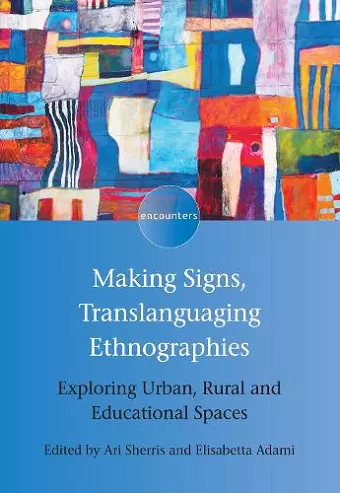Making Signs, Translanguaging Ethnographies
Exploring Urban, Rural and Educational Spaces
Elisabetta Adami editor Ari Sherris editor
Format:Hardback
Publisher:Multilingual Matters
Published:29th Oct '18
Currently unavailable, and unfortunately no date known when it will be back
This hardback is available in another edition too:
- Paperback£32.95(9781788921909)

Ignites the conversation within applied linguistics of how we make meaning and communicate
This book is the start of a conversation across Social Semiotics, Translanguaging, Complexity Theory and Sociolinguistics. In its explorations of meaning, multimodality, communication and emerging language practices, the book includes theoretical and empirical chapters that move toward an understanding of communication in its dynamic complexity.
This book is the beginning of a conversation across Social Semiotics, Translanguaging, Complexity Theory and Radical Sociolinguistics. In its explorations of meaning, multimodality, communication and emerging language practices, the book includes theoretical and empirical chapters that move toward an understanding of communication in its dynamic complexity, and its social semiotic and situated character. It relocates current debates in linguistics and in multimodality, as well as conceptions of centers/margins, by re-conceptualizing communicative practice through investigation of indigenous/oral communities, street art performances, migration contexts, recycling artefacts and signage repurposing. The book takes an innovative approach to both the form and content of its scholarly writing, and will be of interest to all those involved in interdisciplinary thinking, researching and writing.
After beginning as an orientation to communicative practices that transcend labeled languages, Translanguaging now analyzes practices that transcend language itself, to include diverse semiotic resources in expansive time/space materialities. Scholars are breaking free from the limiting forms of linguistic exceptionalism, methodological individualism, and cognitive representationalism to study meanings as embodied, embedded, and extended. This book provides significant methodological and theoretical pathways to undertake this form of inquiry.
* Suresh Canagarajah, Pennsylvania State University, USA *Multimodality used to take its cues from systemic linguistics while yet distancing itself from language and linguists. In this stimulating book a new generation of multimodalists takes its cues from contemporary sociolinguistics, with its emphasis on diversity and complexity, and re-engages with language (languaging) and linguists, all the while retaining what has been essential since Barthes’ Mythologies: linking everyday cultural artefacts and practices to an understanding of the social.
* Theo van Leeuwen, University of Southern Denmark; Emeritus Professor, University of Technology Sydney, Australia *The human world is a complex network of emergent, self-maintaining and self-transforming meanings. It is a world of processes that take place in the interactions between and within people, objects, tools, signs, spaces, practices of all kinds and sorts. Human communication and meaning making can only be understood if both the complexity and the semiotic nature of all these processes are taken into account. But such a theoretical and methodological stance implies that scientists understand that their own practice of research, theory building and communication is itself also a complex network of emergent, self-maintaining and self-transforming meanings in a multifaceted interaction between animate and inanimate agents of all different sorts, including not in the least the people and practices that scientists are studying. This understanding is not a contemplative position: it is a reflexive practice, a way of doing the science of language and communication that enacts the very complexity and entanglement that their scientific practices are trying to understand and change. Sherris and Adami have done a wonderful job in bringing together — bringing into entanglement, I should say — a variety of semiotic and complexity-oriented contributions into a transformative and multifaceted dialogue on language and communication. This book makes an inspiring and thought-provoking contribution to the emergent process of meaning making about making signs and translanguaging ethnographies that far transcends the confinements of the typically isolated scholarly topic of the all too often too fragmented academic world.
* Paul van Geert, University of Groningen, The Netherlands *In this thought-provoking volume, both the editors and contributors have successfully managed to explore uncharted territory in a myriad of ways, theoretically, methodologically and analytically by forging new pathways on how we think about and explore communication and sign-making in local and global contexts.
-- Kellie Gonçalves, University of Oslo, Norway * Linguistic Landscape 5:3 *Theoretically, this book contributes to the philosophical perspective on the roles of language and other previously marginalized semiotic resources in meaning-making. Methodologically, it advocates an ethnographic approach to reveal a holistic picture of communication in a fast-changing superdiverse society. Analytically, it is an attempt to provide a toolkit to account for meaning-making in a dynamic sociocultural context.
-- Ying Lu, Tilburg University, Netherlands * Language in Society, Volume 48, Issue 5 *This is an exceptionally innovative, provocative, and well-planned volume that successfully embodies values of complexity, dialogue, and multimodality that it seeks to promote. By facilitating heterarchic conversations across social semiotics, sociolinguistics, translanguaging, and complexity theory, Making Signs, Translanguaging Ethnographies enriches all of these domains while raising theoretical and methodological questions that will continue to be generative of ever-evolving transdisciplinary dialogue.
-- Monica Shank Lauwo, University of British Columbia, Canada * Applied Linguistics 20ISBN: 9781788921916
Dimensions: 210mm x 148mm x 15mm
Weight: 390g
208 pages